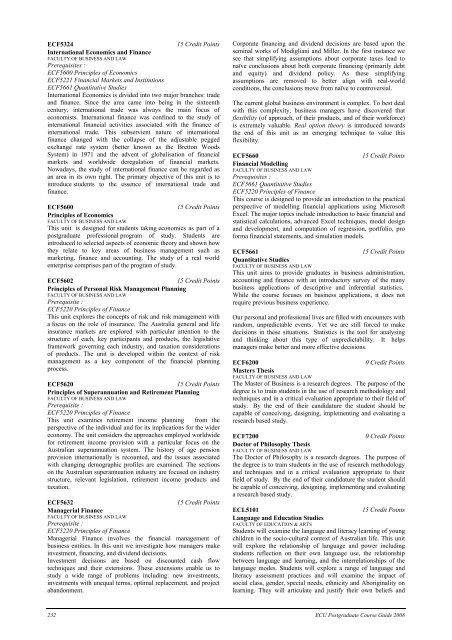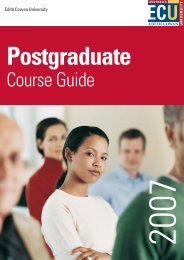Postgraduate - Edith Cowan University
Postgraduate - Edith Cowan University
Postgraduate - Edith Cowan University
You also want an ePaper? Increase the reach of your titles
YUMPU automatically turns print PDFs into web optimized ePapers that Google loves.
ECF5324 15 Credit Points<br />
International Economics and Finance<br />
FACULTY OF BUSINESS AND LAW<br />
Prerequisites :<br />
ECF5600 Principles of Economics<br />
ECF5221 Financial Markets and Institutions<br />
ECF5661 Quantitative Studies<br />
International Economics is divided into two major branches: trade<br />
and finance. Since the area came into being in the sixteenth<br />
century, international trade was always the main focus of<br />
economists. International finance was confined to the study of<br />
international financial activities associated with the finance of<br />
international trade. This subservient nature of international<br />
finance changed with the collapse of the adjustable pegged<br />
exchange rate system (better known as the Bretton Woods<br />
System) in 1971 and the advent of globalisation of financial<br />
markets and worldwide deregulation of financial markets.<br />
Nowadays, the study of international finance can be regarded as<br />
an area in its own right. The primary objective of this unit is to<br />
introduce students to the essence of international trade and<br />
finance.<br />
ECF5600 15 Credit Points<br />
Principles of Economics<br />
FACULTY OF BUSINESS AND LAW<br />
This unit is designed for students taking economics as part of a<br />
postgraduate professional program of study. Students are<br />
introduced to selected aspects of economic theory and shown how<br />
they relate to key areas of business management such as<br />
marketing, finance and accounting. The study of a real world<br />
enterprise comprises part of the program of study.<br />
ECF5602 15 Credit Points<br />
Principles of Personal Risk Management Planning<br />
FACULTY OF BUSINESS AND LAW<br />
Prerequisite :<br />
ECF5220 Principles of Finance<br />
This unit explores the concepts of risk and risk management with<br />
a focus on the role of insurance. The Australia general and life<br />
insurance markets are explored with particular attention to the<br />
structure of each, key participants and products, the legislative<br />
framework governing each industry, and taxation considerations<br />
of products. The unit is developed within the context of risk<br />
management as a key component of the financial planning<br />
process.<br />
ECF5620 15 Credit Points<br />
Principles of Superannuation and Retirement Planning<br />
FACULTY OF BUSINESS AND LAW<br />
Prerequisite :<br />
ECF5220 Principles of Finance<br />
This unit examines retirement income planning from the<br />
perspective of the individual and for its implications for the wider<br />
economy. The unit considers the approaches employed worldwide<br />
for retirement income provision with a particular focus on the<br />
Australian superannuation system. The history of age pension<br />
provision internationally is recounted, and the issues associated<br />
with changing demographic profiles are examined. The sections<br />
on the Australian superannuation industry are focused on industry<br />
structure, relevant legislation, retirement income products and<br />
taxation.<br />
ECF5632 15 Credit Points<br />
Managerial Finance<br />
FACULTY OF BUSINESS AND LAW<br />
Prerequisite :<br />
ECF5220 Principles of Finance<br />
Managerial Finance involves the financial management of<br />
business entities. In this unit we investigate how managers make<br />
investment, financing, and dividend decisions.<br />
Investment decisions are based on discounted cash flow<br />
techniques and their extensions. These extensions enable us to<br />
study a wide range of problems including: new investments,<br />
investments with unequal terms, optimal replacement, and project<br />
abandonment.<br />
Corporate financing and dividend decisions are based upon the<br />
seminal works of Modigliani and Miller. In the first instance we<br />
see that simplifying assumptions about corporate taxes lead to<br />
naïve conclusions about both corporate financing (primarily debt<br />
and equity) and dividend policy. As these simplifying<br />
assumptions are removed to better align with real-world<br />
conditions, the conclusions move from naïve to controversial.<br />
The current global business environment is complex. To best deal<br />
with this complexity, business managers have discovered that<br />
flexibility (of approach, of their products, and of their workforce)<br />
is extremely valuable. Real option theory is introduced towards<br />
the end of this unit as an emerging technique to value this<br />
flexibility.<br />
ECF5660 15 Credit Points<br />
Financial Modelling<br />
FACULTY OF BUSINESS AND LAW<br />
Prerequisites :<br />
ECF5661 Quantitative Studies<br />
ECF5220 Principles of Finance<br />
This course is designed to provide an introduction to the practical<br />
perspective of modelling financial applications using Microsoft<br />
Excel. The major topics include introduction to basic financial and<br />
statistical calculations, advanced Excel techniques, model design<br />
and development, and computation of regression, portfolio, pro<br />
forma financial statements, and simulation models.<br />
ECF5661 15 Credit Points<br />
Quantitative Studies<br />
FACULTY OF BUSINESS AND LAW<br />
This unit aims to provide graduates in business administration,<br />
accounting and finance with an introductory survey of the many<br />
business applications of descriptive and inferential statistics.<br />
While the course focuses on business applications, it does not<br />
require previous business experience.<br />
Our personal and professional lives are filled with encounters with<br />
random, unpredictable events. Yet we are still forced to make<br />
decisions in these situations. Statistics is the tool for analysing<br />
and thinking about this type of unpredictability. It helps<br />
managers make better and more effective decisions.<br />
ECF6200 0 Credit Points<br />
Masters Thesis<br />
FACULTY OF BUSINESS AND LAW<br />
The Master of Business is a research degrees. The purpose of the<br />
degree is to train students in the use of research methodology and<br />
techniques and in a critical evaluation appropriate to their field of<br />
study. By the end of their candidature the student should be<br />
capable of conceiving, designing, implementing and evaluating a<br />
research based study.<br />
ECF7200 0 Credit Points<br />
Doctor of Philosophy Thesis<br />
FACULTY OF BUSINESS AND LAW<br />
The Doctor of Philosophy is a research degrees. The purpose of<br />
the degree is to train students in the use of research methodology<br />
and techniques and in a critical evaluation appropriate to their<br />
field of study. By the end of their candidature the student should<br />
be capable of conceiving, designing, implementing and evaluating<br />
a research based study.<br />
ECL5101 15 Credit Points<br />
Language and Education Studies<br />
FACULTY OF EDUCATION & ARTS<br />
Students will examine the language and literacy learning of young<br />
children in the socio-cultural context of Australian life. This unit<br />
will explore the relationship of language and power including<br />
students reflection on their own language use, the relationship<br />
between language and learning, and the interrelationships of the<br />
language modes. Students will explore a range of language and<br />
literacy assessment practices and will examine the impact of<br />
social class, gender, special needs, ethnicity and Aboriginality on<br />
learning. They will articulate and justify their own beliefs and<br />
232 ECU <strong>Postgraduate</strong> Course Guide 2008



